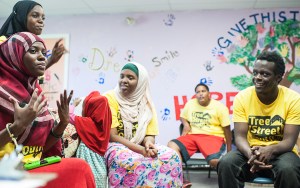LEWISTON — Mohamed Jabril hasn’t had anything to eat or drink during the 15-plus hours from sunrise to sunset since June 18, the beginning of the Muslim fasting month of Ramadan.
It sounds difficult but it isn’t, said Jabril, 17, who works as a counselor at the Tree Street Youth Center and is a senior at Lewiston High School.
“You can go all day without water,” he said. “You eat in the early, early morning, around 2:30 a.m., before the sun rises. You stuff your belly. Otherwise, it’s going to be a long, hard day.”
Ramadan ends on the holy day of Eid al-Fitr, which will be celebrated Friday in Lewiston by the large Somali community. Eid means “festival” or “holiday.”
Eid al-Fitr is an important day when Muslims wear their best clothes, pray and break the fast with friends and family. Prayers on Friday will be held at the Lewiston Memorial Armory instead of the mosque to allow for a larger crowd, according to mosque director Hassan Iden.
The 30 days of fasting that lead up to Eid are a time of intense devotion and self-reflection to become a better person. Exceptions to fasting are made for children and those with health concerns.
Fasting for 30 days “is a way to test yourself, to see how well you avoid temptations like food and water and have some self-control,” Jabril said. It is required of Muslims during Ramadan “as a testimony to our God.”
Fourteen-year-olds Sulekha Abdow, Ubah Aliyow and Abdi Fatah, who attend the Tree Street Youth Center, also fasted during Ramadan.
“I just don’t think about it,” Aliyow said of not eating or drinking.
They explained that Ramadan is a time of striving to be the best person they can be, of doing for others, of giving to the poor and reading the Quran.
Girls aren’t supposed to socialize with boys, Aliyow said.
“You can’t gossip. No music,” she said. “You can’t lie.” Praying five times a day is essential, starting with prayer before the sun rises.
“You have to pray and give zakat (charity) to poor people,” said Rilwan Osman, executive director of the Maine Immigrant and Refugee Services on Birch Street.
“It is a holy month to avoid sins, saying negative or bad things,” Osman said. “You cannot fight. It is a way to clean yourself, a very important month.”
While the teens said fasting wasn’t difficult, Osman said it is hard. With Ramadan this year falling in June and July, “people had a lot of concerns. The long hours. The heat,” Osman said. “Thanking God, it’s going well.”
At his job, he’s surrounded by others also fasting. But other Muslims go about their normal life, including going to work, while skipping food and water. “You cannot just sit at home,” Osman said.
ZamZam Mohamud said she observed Ramadan while working 12-hour shifts. She’s a CNA and interpreter at Central Maine Medical Center. Ramadan is important to her and her family, she said.
Ramadan and Eid unite Muslims all over the world, Osman said. Sulekha Abdow and Ubah Aliyow said the self-reflection and devotion help them grow.
“If you can be good throughout Ramadan, you can be good throughout your whole life,” Aliyow said.
The majority of youths at the Tree Street center are Muslim, said Executive Director Julia Sleeper. Workers and students try to be respectful of the culture, “especially during Ramadan, understanding that kids are fasting and have separate spaces during lunch.”
Since some enrichment classes have music, certain Somali students don’t participate, she said.
Somali youths take Ramadan seriously, she said, challenging themselves to be better.
“I’ve been amazed, especially this year,” she said. “The kids working for us are fasting, but they come to work and are professional, working with children who are often challenging.”
She added, “You don’t hear these kids moaning and groaning. It’s such a motivational, spiritual component of who they are.”
During Ramadan, they explain Muslim expectations to non-Muslim youths, who learn to respect a different culture. “It’s nice,” Sleeper said. “If there wasn’t any Ramadan, that conversation may never happen.”

Comments are no longer available on this story